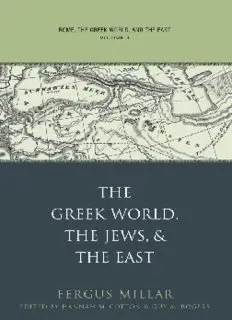
Rome, the Greek World, and the East: Volume 3: The Greek World, the Jews, and the East (Studies in the History of Greece and Rome) PDF
Preview Rome, the Greek World, and the East: Volume 3: The Greek World, the Jews, and the East (Studies in the History of Greece and Rome)
Rome, the Greek World, and the East StudiesintheHistoryofGreeceandRome RobinOsborne,P.J.Rhodes,andRichardJ.A.Talbert,editors Rome, the Greek World, and the East The Greek World, the Jews, and the East Fergus Millar Edited by Hannah M. Cotton and Guy M. Rogers TheUniversityofNorthCarolinaPress ChapelHill ©TheUniversityofNorthCarolinaPress Allrightsreserved SetinBembo byTsengInformationSystems,Inc. ManufacturedintheUnitedStatesofAmerica (cid:4)Thepaperinthisbookmeetstheguidelines forpermanenceanddurabilityoftheCommitteeon ProductionGuidelinesforBookLongevity oftheCouncilonLibraryResources. LibraryofCongressCataloging-in-PublicationData Millar,Fergus. Rome,theGreekworld,andtheEast/FergusMillar; editedbyHannahM.CottonandGuyM.Rogers. p. cm.—(StudiesinthehistoryofGreeceandRome) Includesbibliographicalreferencesandindex. Contents:v..TheGreekworld,theJews,andtheEast -:----(cloth:alk.paper) -:---(cloth:alk.paper) -:----(pbk.:alk.paper) -:---(pbk.:alk.paper) .Greece—Civilization..Rome—Civilization. I.Title.II.Series. . —dc cloth paper Contents Preface vii IntroductiontoVolume,byHannahM.Cotton xi Abbreviations xix PartI.TheHellenisticWorldandRome .TheProblemofHellenisticSyria .ThePhoenicianCities:ACase-StudyofHellenisation .HellenisticHistoryinaNearEasternPerspective: TheBookofDaniel .TheBackgroundtotheMaccabeanRevolution:Reflectionson MartinHengel’s‘‘JudaismandHellenism’’ .PolybiusbetweenGreeceandRome .TheGreekCityintheRomanPeriod PartII.RomeandtheEast .ReflectionsontheTrialsofJesus vi Contents .TheRomanColoniaeoftheNearEast:AStudyofCulturalRelations .LatinintheEpigraphyoftheRomanNearEast .PaulofSamosata,Zenobia,andAurelian:TheChurch,LocalCulture, andPoliticalAllegianceinThird-CenturySyria .CaravanCities:TheRomanNearEastandLong-Distance TradebyLand .LookingEastfromtheClassicalWorld:Colonialism,Culture, andTradefromAlexandertheGreattoShapurI PartIII.JewsandOthers .Porphyry:Ethnicity,Language,andAlienWisdom .Hagar,Ishmael,Josephus,andtheOriginsofIslam .EthnicIdentityintheRomanNearEast,..–: Language,Religion,andCulture .Dura-EuroposunderParthianRule .TheJewsoftheGraeco-RomanDiasporabetweenPaganism andChristianity,..– .ChristianEmperors,ChristianChurch,andtheJewsoftheDiaspora intheGreekEast,..– Author’sEpiloguebyFergusMillar:Re-drawingtheMap? Index Preface Fergus Millar, Camden Professor of Ancient History in the University of Oxford emeritus, is one of the most influential ancient historians of the twentiethcentury.SincethepublicationofAStudyofCassiusDiobyOxford University Press in , Millar has published ten books, including two monumentalstudies,TheEmperorintheRomanWorld(Duckworth,)and TheRomanNearEast,..–..(Harvard,).Thesebookshavetrans- formedthestudyofancienthistory. InhisstudyoftheroleoftheemperorintheRomanWorldMillarargued thatthereignofAugustusinauguratedalmostthreecenturiesofrelatively passiveandinertgovernment,inwhichthecentralpowerpursuedfewpoli- ciesandwaslargelycontenttorespondtopressuresanddemandsfrombelow. Afternearlythirtyyearsofscholarlyreaction,TheEmperorintheRomanWorld isnowthedominantscholarlymodelofhowtheRomanEmpireworkedin practice. Reviewers immediately hailed Millar’s magisterial study of the Roman Near East as a ‘‘grand book on a grand topic’’ (TLS, April ). In this grandbook,displayinganunrivaledmasteryofancientliterary,epigraphic, papyrological,andarchaeologicalsourcesinGreek,Latin,Hebrew,Aramaic, andotherSemiticlanguages,MillarmadetheindigenouspeoplesoftheRo- manNearEast,especiallytheJews,centraltoourunderstandingofhowand why the three great religions of the book, Rabbinic Judaism, Christianity, andIslam,evolvedinaculturalcontextthatwasneither‘‘eastern’’nor‘‘west- ern.’’TherecanbenodoubtthatTheRomanNearEast,..–..will bethestandardworkonthesubjectforalongtimetocome. Over the past few years, Millar has published two books, The Crowd in RomeintheLateRepublic(Michigan,)andTheRomanRepublicinPolitical Thought(NewEngland,)onthepoliticsoftheRomanRepublicandhow thosepoliticshavebeenunderstoodormisunderstoodbypoliticalthinkers fromtheancientworldtothepresent.Thesebookshavechallengedwidely vii viii Preface heldnotionsaboutthesupposedoligarchicpoliticalcharacteroftheRoman Republic.Mostrecently,basedupontheSatherLecturesofMillarnow has produced his first work centrally focused upon late antiquity, A Greek RomanEmpire:Power,BeliefandReasonunderTheodosiusII,–. InthefutureMillarintendstoreturntotheRomanNearEast,forastudy to be entitled Society and Religion in the Roman Near East from Constantine to Mahomet.InthisstudyMillarwillbringthestoryofGreco-Romanculture intheNearEastfromtheearlyfourthcenturyuptotheIslamicinvasionsof theseventhcentury..Apparently,theenormoustaskofwritingasocial historyoftheNearEastfromAlexandertoMahometwillnotbeleftcom- pletelytosomeoneelseafterall,asMillarprophesiedin(TheRomanNear East,pp.xii–xiii). During the same period when he has produced these ground-breaking books, Millar also has published more than seventy essays on aspects of Greco-Roman history, from the Hellenistic period until the middle of the fifthcentury..Theseessayshavelaidthefoundationsfororsupplemented theideasandargumentspresentedinMillar’sverywellknownbooks.Some oftheseessays,suchas‘‘TheEmperor,theSenateandtheProvinces’’(Jour- nal of Roman Studies []: –), or ‘‘Emperors, Frontiers and For- eignRelations,..–..’’(Britannia[]:–),haveappearedin hitherto accessible journals and are widely regarded as classics of scholar- ship.Butotheroutstandingessays,suchasMillar’sstudy‘‘Polybiusbetween GreeceandRome’’(publishedinGreekConnections:EssaysonCultureandDi- plomacy[],–),havebeenmoredifficulttolocate,evenforprofessional historiansdoingresearchinthefield. Therefore,theprimarygoalofourcollection,Rome,theGreekWorld,and theEast,istobringtogetherintothreevolumesthemostsignificantofMil- lar’sessayspublishedsinceforthewidestaudiencepossible.Thecollec- tionincludesmanyarticlesthatclearlywillbeofgreatintellectualinterest andpedagogicalusetoscholarsdoingresearchandteachinginthedifferent fieldsofthevolumeheadings:Volume,TheRomanRepublicandtheAugustan Revolution; Volume , Government, Society, and Culture in the Roman Empire; andVolume,TheGreekWorld,theJews,andtheEast. Atthesametime,wehaveconceivedandorganizedthethreevolumesof Rome,theGreekWorld,andtheEastespeciallyinordertomakeMillar’smost significantarticlesreadilyavailabletoanewgenerationofstudents,whoin- creasinglymaynothaveaccesstothespecialtyjournalsoreditedvolumesin whichmanyofMillar’smorerecentarticleshaveappeared. Theprincipleofarrangementoftheessaysineachofthethreevolumes isbroadlychronologicalbysubjectmattertreatedwithintheancientworld. Preface ix Webelievethatthischronologicalarrangementofessays(ratherthanbypub- licationdateoftheessays)givesintellectualcoherencetoeachvolumeonits ownandtothecollectionasawhole.Overall,asMillarhimselfhasdefined it,thesubjectofthiscollectionis‘‘thecommunalcultureandcivilgovern- ment of the Graeco-Roman world, essentially from the Hellenistic period tothefifthcentury..’’(‘‘Author’sPrologue,’’volume,p.). Publication of a three-volume collection of essays, drawn from a wide varietyofjournalsandeditedvolumes,overmorethanfourdecadesofschol- arlyproduction,presentseditorswithsomemajorstylisticchallenges.Our collection contains fifty-four essays (in addition to a prologue and an epi- loguewrittenbyMillarespeciallyforthepresentcollection).Mostofthese essaysoriginallywerepublishedinlearnedjournalsorbooks,eachofwhich haditsownhousestyle.Somelearnedjournalsalsohavechangedtheirhouse stylesoverthetimewhenMillarhaspublishedinthem.Forthesereasonswe havenotattemptedtobringallofthecitationsinthetextsornotesofthe articlesinthecollectionintoperfectstylisticconformity.Conformityforthe sakeofconformitymakesnosense;moreover,toachievesuchconformity woulddelaypublicationofthecollectionforyears. Rather, the stylistic goal of our collection has been to inform readers clearlyandconsistentlywheretheycanfindthesourcescitedbyMillarinhis essays.Tohelpachievethatgoalwehaveincludedalistoffrequentlycited works(withabbreviationsforthoseworks)atthebeginningofeachvolume. Thus, in the text or notes of the essays, readers will find abbreviations for frequently cited journals or books, which are fully cited in our lists at the beginningofeachvolume.Forexample,referencesinthenotestotheabbre- viationJRSrefertotheJournalofRomanStudies.Fortheabbreviationsthem- selveswehaverelieduponthestandardlistprovidedinL’AnnéePhilologique. In certain cases,where there have been individual citations in the original textsornotestomoreobscurecollectionsofinscriptionsorpapyri,wehave expanded the citations themselves in situ, rather than endlesslyexpanding ourlistoffrequentlycitedworks. InaccordancewithFergusMillar’swishes,forthesakeofreaderswhodo notknowLatinorGreek,wehaveprovidedEnglishtranslationsofmostof theextendedGreekandLatinpassagesandsomeofthetechnicaltermscited byMillarinthetextandnotesoftheoriginalessays.Indoingso,wehavefol- lowedthepracticeFergusMillarhimselfadoptedinTheEmperorintheRoman WorldinandinTheRomanNearEastin.Webelievethatproviding these translations will help to make Millar’s essays morewidelyaccessible, whichistheessentialgoalofthecollection.Readerswhowishtoconsultthe originalGreek,Latin,andSemiticpassagesortechnicaltermsthatwehave
